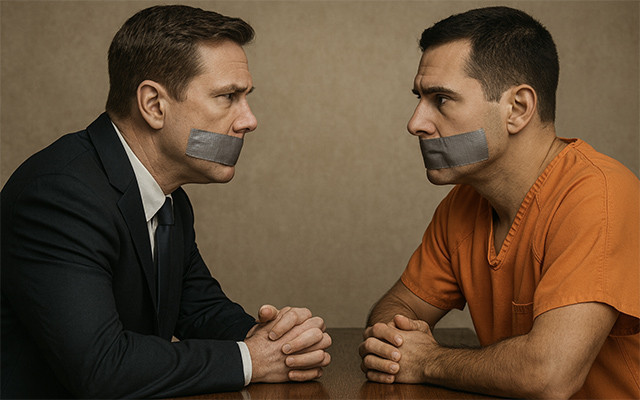
The USA Supreme Court will decide when communication between an advocate and a client can be restricted

The confidentiality of communications between advocates and clients is a fundamental guarantee of protection provided by Ukrainian law. At the same time, there is ongoing debate in the United States about whether a judge can temporarily restrict this right if the defendant is in the process of giving testimony.
The precedent-setting case of Villarreal v. Texas is covered by SCOTUSblog, an online publication specializing in coverage of the USA Supreme Court.
David Villarreal, the only defense witness in his own trial, was instructed by the judge during a break in questioning by his advocate not to discuss his testimony with his defense advocates until the hearing resumed the next day.
Since the defendant was in the process of giving testimony, the advocates should not influence its content during the break. The judge compared the situation to the defendant being on the witness stand in the presence of the jury. «We are in an unusual situation, - the judge said. - You are in the middle of giving testimony. Normally, your advocate cannot consult with you about your testimony in the middle of the trial when the jury is hearing it. So I want to say that you cannot consult with your advocate, but at the same time, you have the right under the Sixth Amendment (an amendment to the USA Constitution that guarantees every defendant the right to effective assistance of counsel - ed.) to communicate with your advocate. I will ask you both to pretend that Mr. Villarreal is still on the witness stand».
The advocates objected but complied with the order. The next day, he continued his testimony and was subsequently sentenced to 60 years in prison.
Citing a violation of the right to effective legal assistance, the advocates appealed the verdict. However, the Texas Court of Criminal Appeals found that the balance between the right to defense and preventing the advocate's influence on the defendant's testimony had been maintained.
Precedents of the USA Supreme Court outline different approaches: in Geders v. United States (1976), a ban on any communication during the night break was found unconstitutional, while in Perry v. Leeke (1989), a 15-minute daytime ban was allowed.
Several state supreme courts have interpreted these precedents as allowing courts to prohibit advocates from discussing testimony with their clients at night if other aspects of the trial can be freely discussed. At the same time, several federal appeals courts have ruled that clients have the right to consult with their advocates at night, even about their own testimony.
In the Villarreal case, the defense insisted that the «no direct discussion of testimony» rule was unrealistic. After all, in practice, it is impossible to separate conversations about testimony from other key defense issues. In such a situation, advocates will be afraid to give advice, fearing accusations of «coaching» or «correcting» testimony. Moreover, the rule threatens the confidentiality of communication between advocate and client, since the only way to control it is for the court to ask the advocate: «What did you discuss with your client last night?».
On the other hand, the advocates in the case agreed to the ban on direct discussion of testimony and did not report any problems in communicating with their clients the next day.
On October 6, the USA Supreme Court will hear the case of Villarreal v. Texas. It is expected to determine the permissible limits of communication between an advocate and a client during breaks in the trial.
© 2025 Unba.org.ua Всі права захищені
"Національна Асоціація Адвокатів України". Передрук та інше використання матеріалів, що розміщені на даному веб-сайті дозволяється за умови посилання на джерело. Інтернет-видання та засоби масової інформації можуть використовувати матеріали сайту, розміщувати відео з офіційного веб-сайту Національної Асоціації Адвокатів України на власних веб-сторінках, за умови гіперпосилання на офіційний веб-сайт Національної Асоціації Адвокатів України. Заборонено передрук та використання матеріалів, у яких міститься посилання на інші інтернет-видання та засоби масової інформації. Матеріали позначені міткою "Реклама", публікуються на правах реклами.